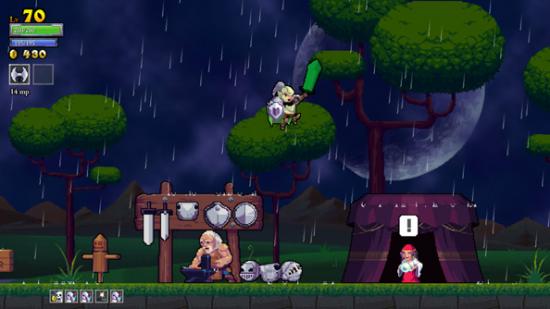If a wizard climbed in my window tonight and gave me a big quest to do, I’d have to turn him away. What if I had to change my contact lenses in the middle of a fight with an imp king? What if there were no toilet facilities on my adventure? Does this wizard want me to get an eye infection? No thanks, you wizard, back out the window with you. People with crap eyesight aren’t cut out for adventures, yet Rogue Legacy is a game all about generations of such uniquely gifted, syndrome-bedraggled and disorder-ridden explorers venturing deeper and deeper into a rogue-like-ish, randomly generated, treasure-laden castle. It’s fun!
Rogue Legacy doesn’t have a point at which is makes any sense to stop playing. You pick your hero from a set of three, each with their own genetic flourish, run into the castle to hack up some eyeballs and wolves, collect gold and die. In death, everything you collected is bestowed upon your heir, another player-chosen hero with their own traits, who can spend that cash on new stat upgrades or equipment. That equipment is sold right outside the castle’s entrance, and as lifespans are so brief in Rogue Legacy, it would seem imprudent to not run right back into the keep and test out your new sword and cape.
And so the game loops around like a sexy ouroboros bastard, with generations of adventurers perishing and newer, stronger heroes emerging from their ashes. At no point does quitting feel like anything but a massive imposition. To call this game’s sense of progression “carrot on a stick” would be misleading, because Rogue Legacy gives you more carrots than you can handle. It’s a trail of lovely carrots leading up a spiral staircase. Yeah.
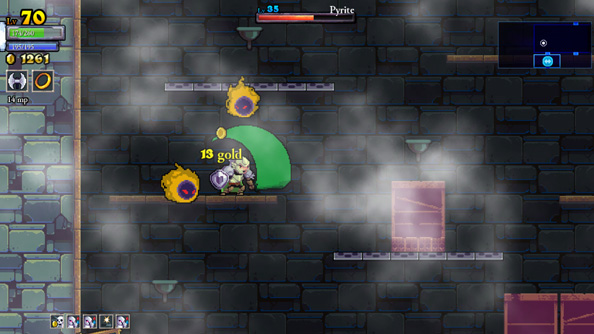
The few dozen possible traits you can find your hero with are less important than you’d think. Some are immediately apparent, such as vertigo, which flips the screen upside down. ADHD makes you move more quickly, dyslexia scrambles any text you encounter, baldness simply makes the word ‘balding’ appear on loading screens. Spotting new traits and figuring out their effects is fun, and once they begin to repeat you’ll start to have to balance negative disorders against a class’s innate strengths and abilities. Would you rather a gold-mining Spelunker with irritable bowel syndrome, or an Archmage with an obscured HP bar owing to a lack of pain receptors?
You don’t have to think too hard about your choice of hero, as for the first few hours of play they’ll be lasting mere handfuls of minutes inside the castle. Traits aren’t passed from parent to child either, rather they’re generated at random, so you needn’t worry about spawning a legacy of wretched, flatulent adventurers, or trying to eugenics up a master race of hypergonad assassins. Positive traits exist alongside neutral and negative ones too, allowing for a roll of the dice to set you up with an ideally overpowered hero.
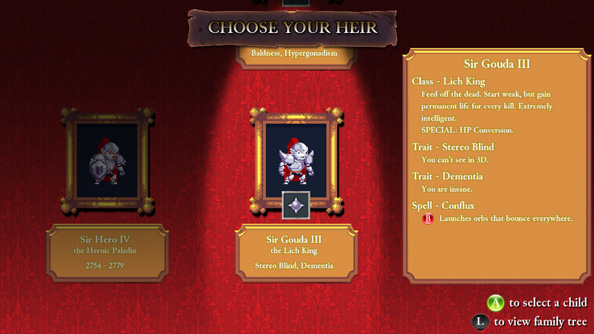
But more important is the adventuring itself. The randomised castle interior is divided into the keep, the forest, the tower and the dungeon, with each area always remaining roughly in one corner of the map and hosting monsters of increasing strength. Hundreds of individual rooms are designed by hand, with objects and enemies randomly dispersed around them, and these rooms are then scrambled and arranged in an unpredictable manner. Some rooms are rarer than others, presenting challenges in the form of spike pits and awkward disappearing platforms that you must trigger with downward strikes. Even after six hours in Rogue Legacy, the castle continued to present rooms I hadn’t seen, alongside more familiar rooms through which I could more comfortably navigate.
Multiple paths naturally form through the conjured schematics of the castle, allowing you to bypass tougher areas, though it’s often in the more challenging rooms that treasure chests are kept. Certain chests present an objective for the room in which they reside, sometimes requiring you to take no damage, or to reach the chest without jumping, and often requiring the use of certain rune abilities, such as the double jump, which you either have equipped or you don’t. Those special chests contain blueprints for the armourer or runes for the enchantress, vendors outside the castle walls who’ll turn your gold into useful equipment.
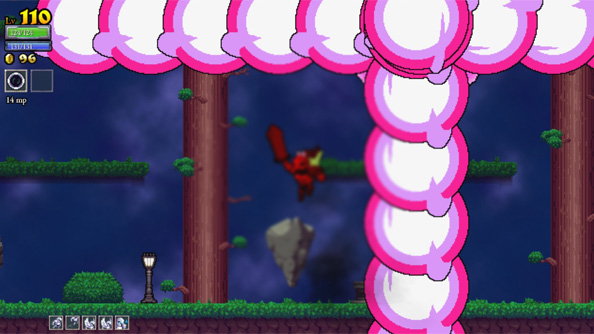
The combination of equipment and runes allows for distinct builds too. For example, restoring HP in Rogue Legacy is difficult, with chicken drumsticks oh so rarely popping out of destroyed furniture, so by stacking vampirism runes, weapons and armour early in my game I could soak up HP with each kill, prolonging my life and allowing me to scoop up more cash with each trip to the castle. The tradeoff was a massive cut in strength, but it speaks to Rogue Legacy’s intelligent design that either method is viable given the correct class and trait.
That clever design seeps back into features like the architect, who locks down the previous castle design (for a penalty of 70% gold found) to allow you to attempt to tackle a tricky room for a second time. Any gold not spent is forfeited upon re-entering the castle too, preventing you from amassing wealth. Enemy desigs see animations betraying upcoming attacks while satisfyingly physical knockbacks and predictable movement patterns support real finesse of control (it’s got nice jumps). Rogue Legacy is Castlevania degrees of difficult though, and if you can’t grasp the finer points of the game’s platforming and sword swinging you might find yourself on the painfully grinding side of the game’s bell curve, accruing mere pittances and getting nowhere.
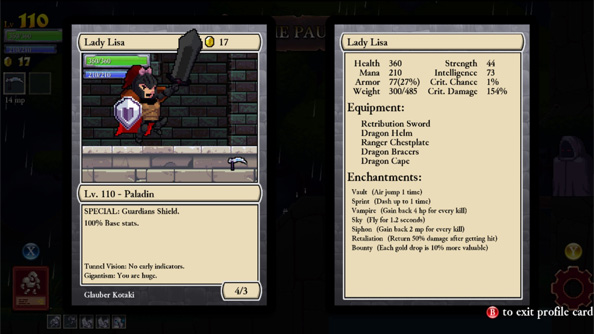
Once you get past the game’s first score of demoralising deaths you’ll begin to see your abilities blossom, however. Better classes of higher level hero become available with enough gold spend, and even the game’s basic systems begin to relent as you progress: you can cheat death, maximise your gold yield, weaken all enemies and even retain some cash between generations.
The pace is arduous to begin with, which can be offputting, but death is of so little consequence in Rogue Legacy that you’ll burn through entire lineages in pursuit of your next trinket. Generation after generation will perish, and all of their foibles will wash over you as if they were naught but pips in this roguelike’s bitter lemonade cocktail of death. If this game sets out to teach us anything it’s that, in spite of our tiny differences, we’re all largely similar in the face of a bigger objective, unless you’re a Lich King, in which case you’re better than most people, or unless you’ve got vertigo, in which case you’re shit.
